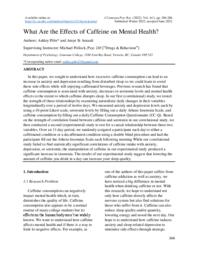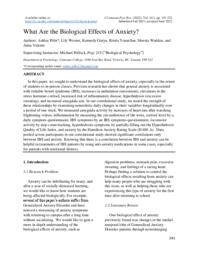Ashley Pifer
Person Preferred Name
(none provided) (none provided)
Related Works
Content type
Digital Document
Description / Synopsis
In this paper, we sought to understand how excessive caffeine consumption can lead to an increase in anxiety and depression resulting from disturbed sleep so we could learn to avoid these side effects while still enjoying caffeinated beverages. Previous research has found that caffeine consumption is associated with anxiety, decreases in serotonin levels and mental health effects to the extent to which caffeine disrupts sleep. In our first (correlational) study, we tested the strength of these relationships by examining naturalistic daily changes in their variables longitudinally over a period of twelve days. We measured anxiety and depression levels each by using a 10-point Likert scale, serotonin levels by filling out a daily Athens Insomnia Scale, and caffeine consumption by filling out a daily Caffeine Consumption Questionnaire (CC-Q). Based on the strength of correlation found between caffeine and serotonin in our correlational study, we then conducted a second (experimental) study to test for a causal relationship between these two variables. Over an 11-day period, we randomly assigned a participant each day to either a caffeinated condition or a decaffeinated condition using a double blind procedure and had the participant fill out the Athens Insomnia Scale each following morning While our correlational study failed to find statistically significant correlations of caffeine intake with anxiety, depression, or serotonin, the manipulation of caffeine in our experimental study produced a significant increase in insomnia. The results of our experimental study suggest that lowering the amount of caffeine you drink in a day can increase your sleep quality.
Origin Information
Content type
Digital Document
Description / Synopsis
In this paper, we sought to understand the biological effects of anxiety, especially in the return of students to in-person classes. Previous research has shown that general anxiety is associated with irritable bowel syndrome (IBS), increases in ambulation (movement), elevations in the stress hormone cortisol, increased risk of inflammatory disease, hyperhidrosis (excessive sweating), and increased amygdala size. In our correlational study, we tested the strength of these relationships by examining naturalistic daily changes in their variables longitudinally over a period of one week. We measured amygdala activity by increases of heart rate after watching frightening videos, inflammation by measuring the circumference of the wrist, cortisol level by a daily symptom questionnaire, IBS symptoms by an IBS symptoms questionnaire, locomotor activity by step count tracking, hyperhidrosis symptoms by partially filling out the Hyperhidrosis Quality of Life Index, and anxiety by the Hamilton Anxiety Rating Scale (HAM-A). Data pooled across participants in our correlational study showed significant correlations only between IBS and anxiety. Knowing that there is a correlation between IBS and anxiety can be helpful in treatments of IBS patients by using anti-anxiety medications in some cases, especially for patients with emotional distress.
Origin Information

